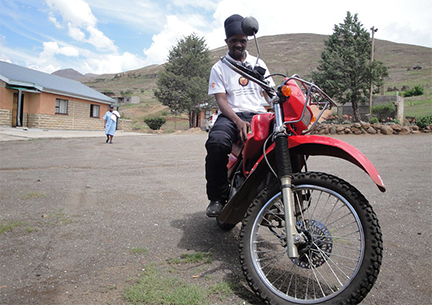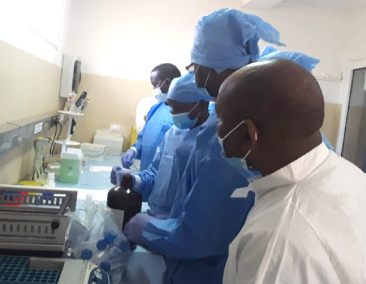 By Alash’le Abimiku, PhD
By Alash’le Abimiku, PhD
Principal Investigator
As Malawi and Mozambique have expanded HIV treatment and care, the need for a robust and efficient laboratory services sector is critical in securing epidemic control. HIV care depends on quality test results in order to improve diagnosis and provide appropriate treatment. Under PEPFAR, Ciheb/UMB has added two more countries—Malawi and Mozambique—to those in which it is helping build effective public health laboratory networks.
When COVID-19 arrived in southern Africa, the CDC supported us with supplmental funding to develop related testing capacity in Malawi and Mozambique in support of the governements of both countries. Fortunately, the real-time polymerase chain reaction (PCR) assays to test for HIV are the same for COVID-19.
So far, we have activated three labs in Malawi, and eventually will activate an additional eight within the next couple of weeks. The automated machines in each lab are capable of completing 400 to 800 tests per day, which should be able to keep up with testing demand as the outbreak spreads. As part of activating each lab, we sent biomedical engineers to inspect and service biosafety cabinets to ensure their functionality. We also developed training materials for lab technicians to run the COVID-19 tests and have supplied each lab with needed protective gear. We finished conducting training for the lab techs about a week ago.
However, a limiting factor in expanding COVID-19 testing is the supply of test kits, which are difficult to obtain everywhere but much more so on the African continent. We secured 30,000 kits so far for Malawi. We have continued to advocate for more kits, and are working with several companies, Africa CDC, and the US Ambassador in Malawi to find a way to obtain an additional 100,000 kits for use in these countries.

In addition to setting up the labs and advocating for test kits, the third area we are involved in is ensuring that sample collection and transportation is done safely and efficiently. The labs are located in various parts of the country, and samples must be delivered to them by courier. We partnered with Riders for Health International—an NGO that provides healthcare-related transportation services for rural African populations—to supply 80 motorbikes to deliver the samples.
To further improve the turnaround time from collection to testing, we have developed an app that works on a tablet or smartphone. The app will streamline tracking sample collection and transport.

The progress that we have made in Malawi will help as we roll out the same support in Mozambique. We will translate all the training materials and other guidance we have developed for Malawi into Portuguese, which is Mozambique’s national language. In addition, we will support the government of Mozambique to utilize the GeneXpert machines used for the diagnosis of resistant tuberculosis to also test for COVID-19.
Alash’le Abimiku, PhD, is the Executive Director of the International Research Centre of Excellence at the Institute of Human Virology Nigeria, which she co-founded; a Professor of Virology at the University of Maryland, Baltimore School of Medicine; and a Principal Investigator and Senior Technical Advisor for Laboratory Services with Ciheb.

